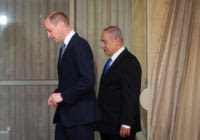King Hezekiah, Prophet Isaiah Debut in Oklahoma
JERUSALEM, Israel – King Hezekiah and the Prophet Isaiah worked together in biblical times and
now thanks to archaeology, they're together again…in Oklahoma of all places!
Personal seal impressions that likely belonged to the two men are on display together for the first time.
A simulcast linking Jerusalem with Oklahoma's Armstrong Auditorium marked the debut.
"This is a celebration day for all our friends and especially for the lovers of Israel and the Bible,"
Archaeologist Dr. Eilat Mazar told participants in both Jerusalem and Oklahoma during the opening
of the exhibit.
 Dr. Eilat Mazar, Photo, CBN News, Jonathan Goff
Dr. Eilat Mazar, Photo, CBN News, Jonathan Goff
Related
Mazar helped uncover the artifacts in 2009.
"This is one of the bullae that we found," Mazar said pointing to a large poster of the artifact. "It's a
seal impression, very tiny, as large as you can see it now but this is all of one centimeter [less than
half an inch] in diameter, even not the nail on my finger."
Workers uncovered both items just a few feet apart at the foot of the Temple Mount, just outside the
present-day walls of Jerusalem's Old City. Historically that area has been called the "Ophel" meaning
"a high place to climb to."
King Hezekiah, considered one of Judea's greatest leaders, and the Prophet Isaiah lived some 2,700
years ago.
"When people wanted at that time, biblical times, to seal a document, they tied the document with
a string and then they took a little tiny mud and pushed their private seal to the soft mud and made
[a] seal impression. You could read their names," Mazar told CBN News.
Hezekiah's reads, "Belonging to Hezekiah, [son of] Ahaz, King of Judah."
"To find such a private item, that relates to one of the Judean kings, I believe we've reached kind of
a peak in that matter. We came so close to that kind of figure," Mazar said.
Isaiah's isn't as clear. It reads: "Belonging to Isaiah"… but the second word is missing a letter that
could complete the Hebrew word for "prophet."

Exhibit Curator Brad McDonald, from the Armstrong International Foundation, said it sends a message
when artifacts back up the Bible.
 Curator Brad McDonald, Photo, CBN News, Jonathan Goff
Curator Brad McDonald, Photo, CBN News, Jonathan Goff
"Whenever you find discoveries like this, actual physical items that people can touch and they have
inscribed on them the names of biblical figures, it's always powerful. This is science proving the
Bible," McDonald told CBN News.
Mazar's grandfather Benjamin Mazar, led the first excavation after the 1967 Six-Day War that
 Prof. Benjamin Mazar, Photo, GPO archive
Prof. Benjamin Mazar, Photo, GPO archive
"My grandfather excavated 10 continuous years without stopping," Mazar said. "This was a fantastic
project – almost no parallel in dimensions. Hundreds of people worked. They revealed fantastic remains
of ancient Jerusalem from all periods."
 Prof. Ben Mazar in 1936, Photo, GPO archive, Kluger Zoltan
Prof. Ben Mazar in 1936, Photo, GPO archive, Kluger Zoltan
Stephen Flurry, vice president of the Armstrong International Foundation and president of the
Herbert W. Armstrong College in Edmond, Oklahoma, where the exhibit opened, said the foundation
has been working with the Mazar family for decades.
"We've had a partnership with Dr. Eilat Mazar since 2006, but our relationship with the Mazar family
actually goes back to 1968 when her grandfather worked with the name sake of our college, Herbert
W. Armstrong," Flurry told CBN News.
"Since that time we've sent students to volunteer on the excavations, and we've also provided funding
for some of her work," Flurry said.
Dr. Michael Oren, Israel's minister of diplomacy calls Eilat Mazar "a hero."

Dr. Michael Oren, Photo, CBN News, Jonathan Goff
"She's fought for Israel's future by fighting for its past in the face of a lot of naysayers and particularly
people in the world today who deny a historical connection between Israel and the city of Jerusalem,
people who deny there ever was a King David or King Hezekiah or a Prophet Isaiah," Oren told
CBN News.
"Eilat digs down and she finds it and she proves them all wrong," Oren said.
Ten years ago, while digging in the City of David, Mazar believed she discovered King David's palace.
"It's monumentality is obvious. Everybody can see," Mazar said at the time.
"Also its date - [it has] been constructed sometime around 1,000 BC, the time of King David in
general based on the pottery that we found underneath and within. These facts brought us to
understand that we have got [a] fantastic monumental construction," she said.
While many archaeologists dismiss the Bible, Mazar maintains it to be an "important historical source."
"The biblical stories and the New Testament stories by the way, it goes together because [it] just
prove[s] quite accurately the development of Jerusalem and the way Jerusalem is described is quite
accurate," Mazar said.
The Oklahoma exhibit provides other artifacts, including a life-size replica of Hezekiah's underground
water tunnel. It's open to the public through mid-August.
Oren believes the significance of these pieces go way beyond science.
"Archaeology is not just about revealing the past. Archaeology is about securing our present.
Archaeology is about ensuring our future. Archaeology is about richness; it's about rootedness; and
as Eilat Mazar will tell you, it's about truth," Oren told participants at the exhibit's opening.




























